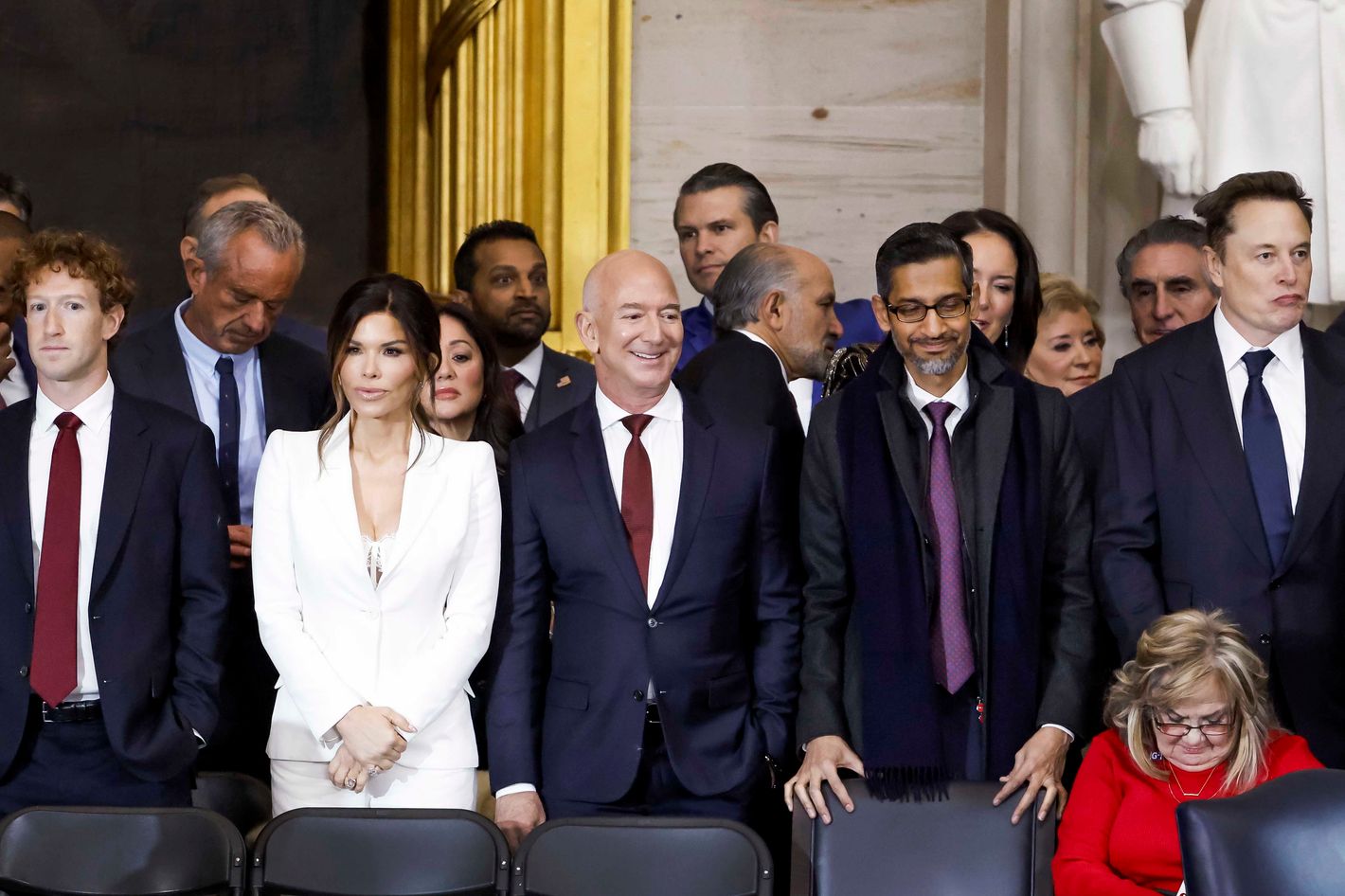Photo: Shawn Thew/Getty Images
Some months before Inauguration Day, JD Vance appeared at the Republican National Convention and said his party was finished “catering to Wall Street.” He added, “We’ll commit to the working man.” When he became vice president on Monday, the “working man” was not much in evidence. Tech moguls, including Elon Musk (the world’s richest man), Jeff Bezos (second), and Mark Zuckerberg (third), enjoyed prominent seats in the Capitol as Vance and Donald Trump took their oaths of office. Later on, the billionaires mingled with Supreme Court justices and lawmakers at the congressional luncheon. They had much to discuss. Monday’s event confirmed the ascension of Trump and Vance, and with them, an elite class with grand ambitions for the future.
Vance’s populism is much discussed but it is a thin fiction, consisting mostly of public remarks rather than legislation or work history. Before he was a senator, he worked in venture capital for Peter Thiel, a tech billionaire known for his far-right views. If Vance somehow harbored an undetectable commitment to the plight of the working class, he clearly abandoned it when he joined the Trump ticket. Trump’s record – as president and as a businessman – spoke for itself. During his first term in office, he appointed the wealthiest cabinet in history and passed tax cuts that enriched corporations and America’s wealthiest households. There was never any reason to believe that Trump’s GOP would stop “catering to Wall Street,” as Vance once put it, and now we see exactly how little his promises meant. Capitalism is triumphant.
The signs are everywhere, from Bezos at the inauguration to a celebration hosted by Passage Press, a far-right publishing house that was trying to sell last-minute tickets for $20,000. As journalist Hannah Gais reported on Sunday, Passage is linked to “the revival of neoreactionary thought, an anti-democracy, anti-egalitarian movement that has found new life — thanks in no small part to the tech elite that sees Trump 2.0 as an opportunity for a cash grab.” Neoreactionaries profess something more than simple blood-and-soil fascism, Gais explained; they cloak their beliefs in mysticism, too. They have become wealthy not through chance or exploitation, but because they are spiritually and intellectually worthy of success. Neoreactionary figureheads like Curtis Yarvin, who is influential among some Silicon Valley elite, can provide “a sense of mystery to what is essentially a shakedown of the U.S. government that these industry elites see themselves as entitled to,” Gais added. Neoreactionaries justify old-fashioned capitalist excess with tales of their own personal superiority – there’s nothing new about that. Gais concludes by asking if “embracing neoreaction’s mystique” is merely “a means of dressing up nihilistic capitalism as something different?”
The answer may be yes. “Nihilistic capitalism” appeared in Trump’s inaugural speech, when he announced that his administration would rename Denali in favor of its prior moniker, Mount McKinley. Trump then praised the long-dead president for his tariffs and friendliness to big business, which is a fitting choice. Trump resembles McKinley “in his vision of an executive branch that functions as a helpmeet to private business interests,” journalist Chris Lehmann argued in a piece for The Nation. McKinley, Lehmann added, “was elevated to the presidency in the first place largely because he was the consensus candidate for America’s robber-baron caste,” a distinction he shares with Trump. The incoming administration poses no threat to Wall Street, whatever Vance has claimed.
Trump’s election did not mark some blow against the elite class but rather affirmed its enduring power. Joe Biden warned of “oligarchy” in his farewell speech as president and today the oligarchy is victorious, and they have nothing to fear in the short-term future. Trump works for them; meanwhile, the Democratic Party bumbles. Democrats don’t know how to challenge today’s robber barons or whether they should even try. Like their Republican colleagues they are committed to capitalism, leaving intact a political economy that benefits neoreactionary forces even as working families struggle with a cost-of-living crisis that Trump will do nothing to resolve. Instead, Democratic leaders toasted the incoming administration on Monday, a grotesque spectacle of elite camaraderie. Robber barons may well celebrate. Now what will happen to the rest of us?

